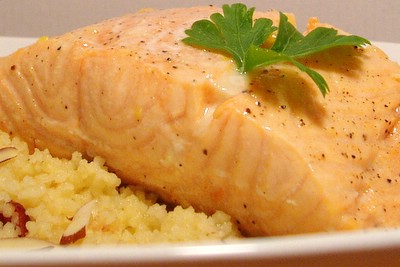 Poached salmon is such a classic that for a long time I have tried hard to like it. I admit that it's not bad cold, and is really awesome in salmon pate, but as an entree I always found it a bit boring. This could be just me, of course, but I find pot-au-feu (chicken and beef cooked in water) really boring too. What good is all that fat and flavor if you are letting it all drain into the liquid? Besides those two dishes, I like all the other classic French stuff. Really, I do! So I guess I'll stop complaining and get back to salmon.
Poached salmon is such a classic that for a long time I have tried hard to like it. I admit that it's not bad cold, and is really awesome in salmon pate, but as an entree I always found it a bit boring. This could be just me, of course, but I find pot-au-feu (chicken and beef cooked in water) really boring too. What good is all that fat and flavor if you are letting it all drain into the liquid? Besides those two dishes, I like all the other classic French stuff. Really, I do! So I guess I'll stop complaining and get back to salmon.A few years ago, a student in one of my fish classes told me about salmon with orange cream sauce. I wish I had his name and contact information so that I could thank him. What a great idea! Orange juice provides a nice tangy kick that the poaching liquid desperately needs. I mix it with a little maple syrup to balance the acidity and match the richness of the salmon. Finish it with a touch of cream, and it's fabulous. The sauce is brothy, but with a nice intensity of flavor without being thick and heavy. Couscous mixed with currants, raisins, cranberries, or some other dried fruit makes a perfect side dish to soak up all that orange sauce. Finally, a poached salmon that even I like.
Fish substitutions: arctic char, steelhead or rainbow trout. Sable and halibut are also delicious cooked this way, but they taste very different from salmon.
Serves 4
1/2 cup dry white wine
1/2 cup water
2 oranges zested and juiced
3 Tbsp maple syrup or honey
4 saffron theads (optional)
4 salmon fillets with or without skin, 6-8 oz each
Salt and pepper
1/4 cup cream
- Bring wine, water, orange juice, orange zest, maple syrup, and optional saffron to a boil in a large skillet that can hold salmon fillets in one layer.
- Season salmon with salt and pepper on both sides and add to the skillet skin side down.
- As soon as the liquid returns to a simmer, reduce heat to low, cover the skillet and poach salmon at a bare simmer for 8 minutes per inch of thickness. To test for doneness, separate the flakes in the thickest part with a fork and peek inside. Salmon is done when the flakes separate, but are still translucent in the center.
- Remove salmon to a plate and peel off its skin (it should come off very easily after salmon is cooked).
- Leave 1 cup of poaching liquid in the skillet and pour the rest off. Reduce it by half over high heat, 3-5 minutes.
- Turn down the heat to medium-low. Stir in the cream. Season to taste with salt and pepper and pour over salmon.

Ah! Interesting recipe for me!
ReplyDeletePaz
Helen:
ReplyDeleteI made this dish yesterday and brought it to Thanksgiving dinner, to rave reviews. It was absolutely fantastic, and was even better chilled and served for breakfast this morning.
I used two large fillets, about 1.5 lbs. each, increased the ingredients by 1/2, and poached the fillets in two batches, adding liquid before the second one.
By the time I finished and strained the liquid, it was nicely reduced, and another 5 minutes left a thick sauce which would have been fine even without the cream (which may be an idea for a lighter version for summer or dieters).
After I stirred in the heavy cream (I used 1/4 cup too much by mistake, to a favorable result) and let it cool for a few hours before serving, it was a thick, rich and subtly aromatic.
Following your suggestion, I cooked a large batch of couscous with currants and slivered almonds, then displayed a large fillet on a bed of couscous on the serving plate.
I will be passing the recipe along to others for their enjoyment.
Wonderful, wonderful recipe. Well done.
Hi Mitch,
ReplyDeleteFish for Thanksgiving -- how wonderful! Thanks for reminding me about this recipe. I haven't made it in a while and you've inspired me. I am in complete agreement about the cream. It's always optional.
Cheers,
-Helen
i made this for dinner last night and it was fantastic! I used blood oranges instead, and reduced all of the poaching liquid instead of pouring any off. The salmon was falling apart tender and moist :) So easy, too! I'll definitely be making this again.
ReplyDelete